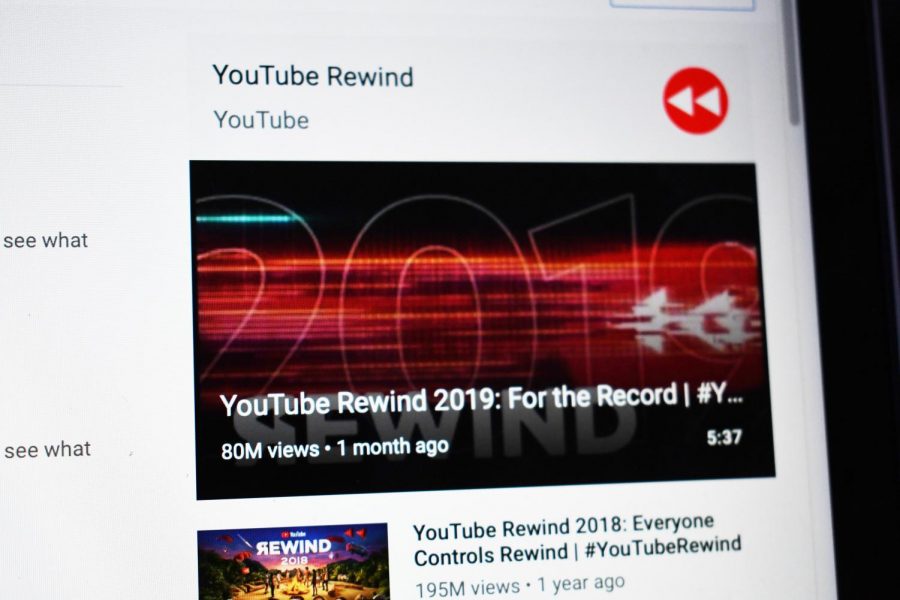Frustrations Towards “YouTube Rewind” Continue Despite Changes
WRONG DIRECTION: Youtube Rewind 2019 now sits as the third most disliked video on the platform, with 8.5 million dislikes.
January 22, 2020
On December 13th, 2010, YouTube released the first “YouTube Rewind” to the masses. Named simply “YouTube Rewind 2010: Year in Review” with a description stating “see what the world watched on YouTube in 2010,” it was a historic internet landmark that would begin a tradition that has become infamous in recent years. In theory, “YouTube Rewind” is a celebration of the YouTube community, featuring the largest creators and trends of the year. However, growing frustrations with YouTube boiled over in 2018 when the site released a “Rewind” featuring celebrities, unpopular YouTubers, and “cringey” out-of-touch humor. “YouTube Rewind 2018: Everyone Controls Rewind” quickly gathered criticism as being out of touch with the “real” YouTube community for featuring corporate celebrities over individual creators and misunderstanding what was really popular over the course of the year. In the end, YouTube Rewind 2018 collected over 17.5 million dislikes and now sits at the top of the list of most disliked YouTube videos in history.
YouTube had been having a rough couple years, starting with 2016, when they began demonetizing videos due to advertiser’s concerns over their advertisements being played before controversial or “un-family friendly” content. For many YouTubers who relied on advertisement revenue as their full-time job, this was a crushing blow and only worsened throughout 2017 and 2018. Senior Mateo Mendoza commented, “For some people it is their legit job and when they’re not getting paid that’s kind of messed up. As a viewer you don’t mind that much, but they should at least support the creators… without them there is no YouTube.” Sophomore Evan Roorda said, “I think YouTube is just being super sensitive. If there was just one tiny little thing that was a little bit inappropriate, it automatically demonetized it and the creators lose a lot of money from that.” Many content creators and consumers shared Mendoza and Roorda’s sentiments, and growing tension between the administration and creators created an underlying attitude of bitterness and negativity. However, there is no obvious solution. To satisfy many content creator’s demands, junior Richard Martin explained that “they [YouTube] would probably have to do something that would not be great for advertisers, because what a lot of people are asking for is a much more open space... but obviously they can’t do that, they’d lose so many advertisers and there is a level of responsibility that kids can go on this website so they do have to be generally responsible with that power.” Still, the grievances towards YouTube do not seem to be going away anytime soon, as more popular content creators are affected and either speak out or are forced to alter their content. This led to much of the tension which ultimately landed “YouTube Rewind 2018” as the most disliked YouTube video in history.
For 2019, many people were waiting eagerly to see what YouTube would do to respond to such backlash. Martin pointed out, “It did not look good in the media to… have 16 million dislikes on a video about the biggest hits on your website.” Their response, as described by freshman Izzy Magoya, was “very safe.” Instead of a giant creator collab with skits, props, and choreographed dancing, they presented a slideshow reel of clips from the most popular YouTube videos over the course of the year. It was devoid of any of the “cringey” humor of 2018, because it was devoid of any humor at all. Going solely off statistics of the year, popular creators were represented including somewhat controversial creator “Pewdiepie” who was noticeably missing from Rewind 2018 despite being the most subscribed to creator on the platform at the time.
Despite this, the video was still majorly disliked. People criticized the video for being boring and cheap, especially compared to past “Rewinds.” Basing the video on statistics, with no original content featured, made many compare it to a low-budget top 10 video. Freshman Kylie Hill said, “You could have just gone on the trending tab and watched the same thing.” However, others admitted that it was an improvement from last year’s and wondered if it has just become a tradition to hate on “YouTube Rewind.” Martin said, “Honestly, I don’t know if it has as much to do with YouTube putting quality into it so much as just the community deciding whether they want to be a troll or not. I feel like most of the dislikes aren’t from people who actually dislike it, they’re just messing with them.”
Whatever the reason, YouTube continues to receive harsh criticism. Demonetization continues, especially impacting more controversial creators or creators who rely on mature humor. But for content creators and consumers, there is not much to do but complain. And some of those complaints come in the form of disliking the annual YouTube Rewind.



